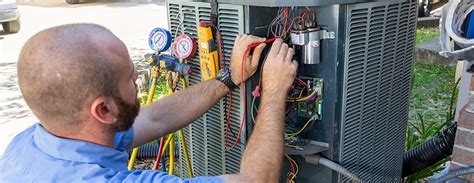The demand for skilled tradespeople has been on the rise in recent years, and one profession that stands out as particularly in-demand is HVAC (heating, ventilation, and air conditioning) technicians. With the growing need for climate control and energy efficiency in buildings, HVAC technicians play a crucial role in ensuring that heating and cooling systems are installed, maintained, and repaired properly. In this article, we will explore the reasons behind the high demand for HVAC technicians, the benefits of pursuing a career in this field, and what it takes to become a successful HVAC technician.
The Growing Demand for HVAC Technicians
The demand for HVAC technicians is driven by several factors. Firstly, the construction industry is booming, with new buildings and homes being built every day. These structures require modern heating and cooling systems, which in turn creates a need for skilled technicians to install, maintain, and repair them. Additionally, existing buildings are being retrofitted with new HVAC systems to improve energy efficiency and reduce carbon emissions.
Furthermore, the increasing focus on indoor air quality and comfort has led to a growing demand for HVAC systems that can provide precise temperature control and air purification. This has created a need for technicians who can design, install, and maintain these complex systems.
Job Outlook and Salary Potential
According to the Bureau of Labor Statistics (BLS), employment of HVAC technicians is projected to grow 13% from 2020 to 2030, which is faster than the average for all occupations. This growth is driven by the increasing demand for HVAC systems in new and existing buildings, as well as the need to replace and upgrade existing systems.
In terms of salary potential, HVAC technicians are well-compensated for their work. The median annual salary for HVAC technicians was $51,840 in May 2020, according to the BLS. However, experienced technicians can earn upwards of $70,000 to $100,000 per year, depending on the location, employer, and level of expertise.

Benefits of a Career as an HVAC Technician
Pursuing a career as an HVAC technician offers numerous benefits. Here are some of the advantages of working in this field:
- Job security: With the growing demand for HVAC systems, technicians can expect stable employment and a high level of job security.
- Variety: Every day is different for an HVAC technician, with new challenges and problems to solve. This variety makes the job exciting and engaging.
- Opportunities for advancement: Experienced technicians can move into supervisory or management roles, or start their own HVAC businesses.
- Good compensation: As mentioned earlier, HVAC technicians are well-compensated for their work, with median salaries ranging from $50,000 to over $100,000 per year.
- Sense of satisfaction: HVAC technicians play a crucial role in ensuring that buildings are comfortable and energy-efficient. This sense of satisfaction can be rewarding and fulfilling.
What It Takes to Become a Successful HVAC Technician
To become a successful HVAC technician, you will need to possess certain skills and qualities. Here are some of the key requirements:
- Technical knowledge: HVAC technicians need to have a strong understanding of heating and cooling systems, including the principles of thermodynamics, electricity, and mechanics.
- Problem-solving skills: Technicians must be able to diagnose and repair complex problems with HVAC systems, which requires strong analytical and problem-solving skills.
- Physical stamina: The job requires standing, bending, and lifting for long periods, so technicians need to be physically fit and able to work in cramped spaces.
- Communication skills: Technicians must be able to communicate effectively with customers, contractors, and other stakeholders to explain complex technical issues and provide excellent customer service.
- Certifications and licenses: Many states require HVAC technicians to be licensed or certified, so it's essential to check the requirements in your area.

How to Get Started as an HVAC Technician
If you're interested in pursuing a career as an HVAC technician, here are the steps you can take to get started:
- Research training programs: Look for vocational schools, community colleges, or technical institutes that offer HVAC training programs. These programs typically last from six months to two years and cover the basics of heating and cooling systems, as well as safety procedures and codes.
- Complete an apprenticeship: Many HVAC technicians complete an apprenticeship program, which provides hands-on experience and on-the-job training.
- Get certified: Check with your state's licensing board to see if certification is required to work as an HVAC technician in your area.
- Gain experience: Start working as an entry-level technician and gain experience by working on different types of HVAC systems and equipment.
- Continuing education: The HVAC industry is constantly evolving, so it's essential to stay up-to-date with the latest technologies and techniques by attending workshops, seminars, and online courses.

Conclusion
The demand for HVAC technicians is high, and this profession offers a lucrative career choice for those who enjoy working with their hands and solving complex problems. With the right training, certifications, and experience, HVAC technicians can earn good salaries and enjoy a high level of job security. If you're interested in pursuing a career as an HVAC technician, research training programs, complete an apprenticeship, get certified, gain experience, and stay up-to-date with continuing education.





What is the average salary of an HVAC technician?
+The average salary of an HVAC technician is around $51,840 per year, according to the Bureau of Labor Statistics.
What kind of training do I need to become an HVAC technician?
+To become an HVAC technician, you typically need to complete a training program in HVAC technology, which can last from six months to two years.
Is certification required to work as an HVAC technician?
+Certification requirements vary by state, but many states require HVAC technicians to be certified or licensed to work in the industry.
